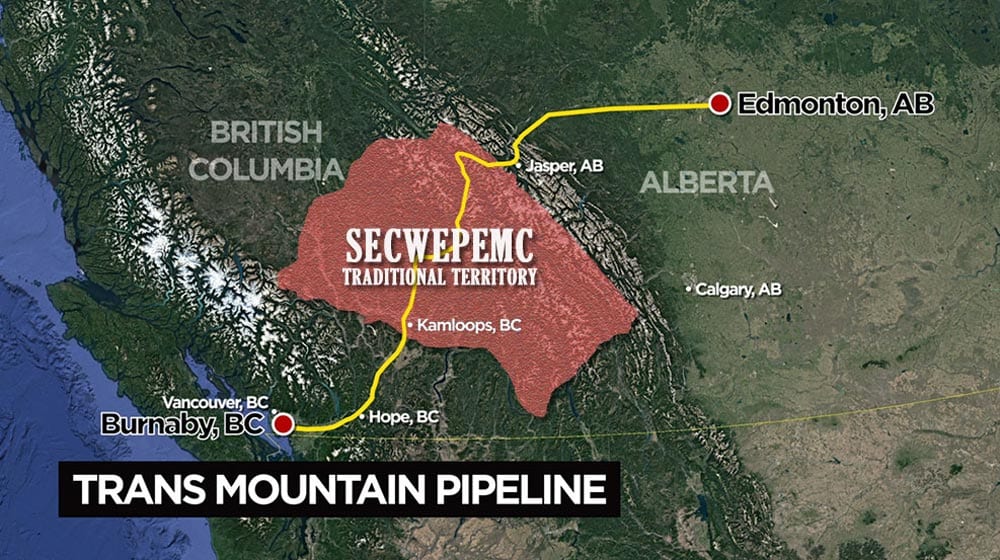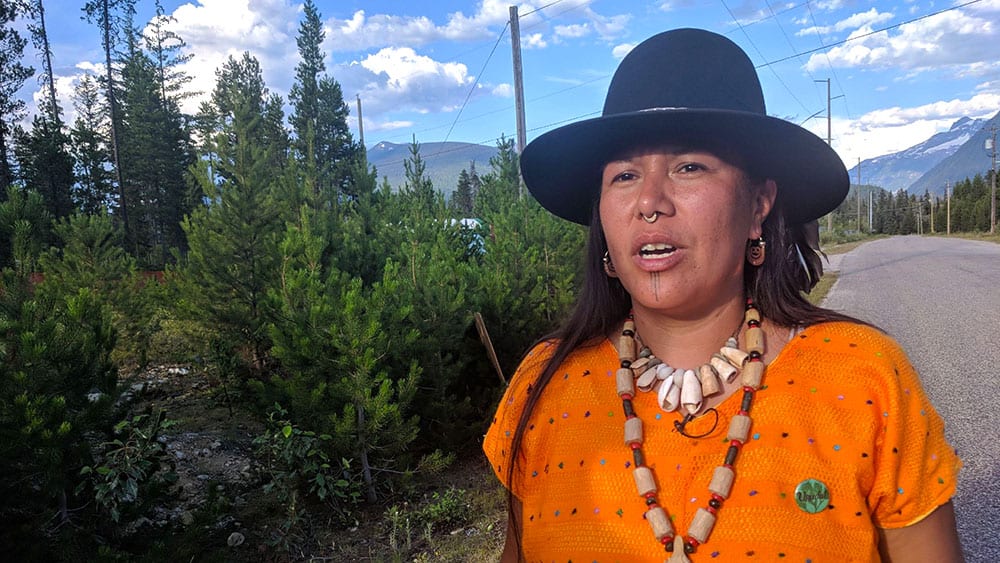Arriving at dusk on Wednesday evening, Russ Diabo strolled into the Tiny House Warriors village in Blue River, B.C., where he was greeted warmly by land defenders and water protectors.
Nearly 2,000 kilometres away north of Winnipeg there was an Assembly of First Nations debate for the five candidates running for national chief, including Diabo.
But the First Nations policy analyst from Kahnawake would rather be with the grassroots people fighting for something he has spent his lifetime warning people about.
The Tiny House Warriors are led by Kanahus Manuel, daughter of Diabo’s longtime comrade, former chief and Indigenous rights ambassador the late Arthur Manuel.
They’ve established themselves next to a planned Trans Mountain pipeline expansion project worker’s accommodations complex in the tiny tourist town.
Speaking to APTN News after his arrival, Diabo said seeing Facebook footage of Manuel’s arrest last Saturday as she and other land defenders occupied a B.C. provincial park compelled him to make the trip.
He said he supports the Tiny House Warriors’ effort in “bringing attention to the need to stop this project and make sure it’s never built.”
Tiny House Warriors highlight broader fight for Indigenous rights and title
He also said the Secwepemc-led fight against the pipeline is “directly connected” to the issue of Aboriginal rights, title and jurisdiction because the Secwepemc have “never ceded or surrendered their land.
“It is Aboriginal title territory, and the people who hold that title are the community people themselves: the families and the communities that make up the nation.”
(AFN National Chief candidate Russell Diabo (centre) visited the Tiny House Warriors at their recently established village in Blue River, B.C. on Wednesday evening. Photo: Justin Brake/APTN)
A longtime advocate for Indigenous rights with decades of experience in land defence movements, including Oka, Barrier Lake, Gustafsen Lake and Wounded Knee, Diabo warns that Indigenous people in Canada are at a pivotal moment with the Trudeau government’s Recognition and Implementation Rights Framework legislation on the way.
The feds have vowed to do away with the Indian Act and end Canada’s comprehensive land claims policies.
Federal Crown-Indigenous Relations Minister Carolyn Bennett has touted the impending legislation as “critical to reconciliation,” while Prime Minister Justin Trudeau has said it will “chart a new way forward for our Government to work with First Nations, Inuit, and Métis Peoples and…undo decades of mistrust, poverty, broken promises, and injustices.”
But Diabo says based on all indications so far, Canada is still working to “extinguish Aboriginal title” in a more covert way than Trudeau’s father, late Prime Minister Pierre Trudeau, attempted to do with the Liberals’ 1969 White Paper.
“They’ve taken a top-down approach, signing these memorandums of understandings with the Assembly of First Nations on fiscal relations, on shared priorities,” he said.
“But even though they did that they went ahead and unilaterally issued 10 principles on Indigenous relationships last year, which are basically preconditions [that are] reinforcing the doctrine of discovery and the Constitution Act 1867, which means the existing constitutional framework of the federal and provincial governments. They’re not recognizing any Indigenous jurisdiction.”
Despite supreme court rulings like Delgamuukw and Tsilhqot’in, which recognize Aboriginal title to unceded lands, Ottawa is “still maintaining their extinguishment approach under this modern treaty process,” Diabo said.
“And this effort by the Tiny House Warriors is a good way to bring attention…to the fact that the prime minister’s ignoring their Aboriginal title and pushing this project through.”
Division within the Secwepemc Nation
Four of the 17 Secwepemc bands established by Canada under the Indian Act have signed agreements with Trans Mountain proponent Kinder Morgan, including Simpcw First Nation—formerly the North Thompson Indian Band—the Tk’emlúps te Secwépemc in Kamloops, the Canim Lake Band, and Pellt’iq’t First Nation .
In May 2016 Kinder Morgan announced it reached a deal with Simpcw First Nation—formerly North Thompson Indian Band—over the section of the pipeline running through its territory as defined under the Indian Act.
“The agreement represents a real partnership – we will play an active role in all aspects of the Project within our Territory, from environmental stewardship to benefiting economically,” former Chief Nathan Matthew said at the time.
Responding to resistance within the wider Secwepemc Nation, Simpcw issued a press release last May.
In it, Matthew said one-third of the pipeline running through Secwepemcel’ucw is on Simpcw territory, and that “no other nation or organization (First Nation or environmental) has the authority to speak on Simpcw’s behalf.”
But Diabo challenges the legal and moral legitimacy of the former Simpcw chief’s claims.
“I know for a fact that this is not the exclusive territory of the North Thompson Indian band,” he told APTN Wednesday. “Secwepemc people have always harvested and used their territory because it’s such a diverse ecosystem.”
In 1996 Diabo was hired to lead a three-year traditional use study for the Neskonlith and Adams Lake bands that showed Secwepemc “roamed all over-harvesting and gathering food and materials throughout the territory,” he said.
“So for one modern Indian Act band to say people from other bands can’t be in the area I think doesn’t stand up to the history and culture and land tenure of the Secwepemc that I’ve seen documented.”
APTN reached out to current Simpcw Chief Shelly Loring but did not receive a response by the time of publication.
Protecting others in a time of divide and conquer
Last spring April Thomas, a member of the Canim Lake Band, told APTN at a Secwepemc-led protest against the pipeline that Canadian laws that draw boundaries between communities within wider Indigenous nations are “just another divide and conquer tactic that’s been used on our people over and over again.
“We have a housing crisis, a poverty crisis and they’ve made our people so desperate that they feel like they’re obligated to sign these agreements because they think that’s all they’re going to get.”
(Kanahus Manuel at the Tiny House Warriors village in B.C. Photo: Justin Brake/APTN)
Earlier this week Kanahus Manuel told APTN the Secwepemc have a responsibility to not only their own people but those of neighbouring nations.
“We are mountain people,” she said, explaining their land, Secwepemcul’ecw, “is the land of spilling waters.”
Manuel said the waters that feed the Fraser, North Thompson and Columbia Rivers “all form in our mountains in Secwepemcul’ecw, so we have a very important job and responsibility, not just to us but to all the Indigenous people that still depend on the salmon.”
Diabo, who also skipped the first AFN leaders’ debate in the Yukon in part to be with those at the Justice For Our Stolen Children camp in Regina, said whether he wins the July 25 AFN election for national chief or not, he will stand with the Tiny House Warriors and others fighting the Trans Mountain pipeline expansion project.
“I’m going to be doing as much as I can to help and encourage and support them.”
With files from Lucy Scholey.














Great stuff! thanks for all your wrk everybody.
Russ Diabo For National Chief!
Great stuff! thanks for all your wrk everybody.
Russ Diabo For National Chief!
Kudos to you Russell, standing with our sisters and brothers is the most important task at hand … while others “talk”, you take action.
Kudos to you Russell, standing with our sisters and brothers is the most important task at hand … while others “talk”, you take action.